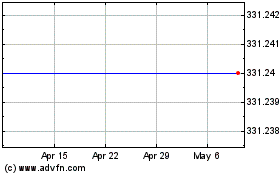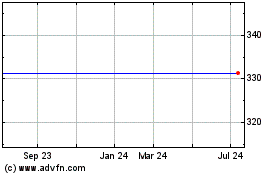FDA Orders Post-Market Testing Of Surgical Mesh Amid Safety Concerns
January 04 2012 - 4:13PM
Dow Jones News
The Food and Drug Administration is ordering manufacturers of
surgical mesh to conduct new studies of the products when used to
treat two conditions affecting millions of women, pelvic organ
prolapse and stress urinary incontinence amid concerns about the
products' safety.
The move is the first step toward tighter regulation of the mesh
when inserted through the vagina to repair pelvic organs, a less
invasive procedure than traditional surgery. Surgical mesh was
initially developed to repair hernias in the 1950s but doctors
later adapted the mesh for other uses.
The mesh products, which are made by several companies including
C.R. Bard Inc., (BCR) Boston Scientific Corp. (BSX) and a unit of
Johnson & Johnson (JNJ), are reviewed under an FDA
device-clearance process that doesn't require preclinical tests in
patients.
In a letter mailed to companies this week, FDA said it's
"concerned with the potential safety risks" of the devices and
ordered studies that would follow women receiving the mesh for at
least three years to look at side-effects as well as to compare
safety and effectiveness to other procedures.
Pelvic organ prolapse, an often painful condition, affects 30%
to 50% of women at some point in their lives, occurs when the
tissues that hold the pelvic organs in place become stretched or
weakened, often from childbirth. Stress urinary incontinence is a
leakage of urine caused by an activity like exercise, coughing or
lifting that puts pressure on the bladder.
The FDA has received hundreds of reports of serious
complications involving the mesh for pelvic organ prolapse in
recent years and some companies are facing lawsuits.
In a safety communication issued in July, the agency said
transvaginal mesh pelvic organ prolapse procedures "poses risks"
and suggested other procedures, such as surgery through the abdomen
was more effective. Many side effects were caused by the mesh
protruding out of the vaginal tissue, which in turn caused pain,
infection and bleeding.
The agency has also proposed requiring some mesh products to
undergo a premarket approval process that would require tests in
patients before a device is approved, but hasn't yet made a final
decision.
But in ordering studies of mesh products already on the market,
FDA suggested companies design the studies in such a way that they
could satisfy requirements for premarket approval applications for
products that would be used in transvaginal pelvic organ prolapse
procedures. The FDA has said it doesn't think mesh products for
stress urinary incontinence need to be reclassified from their
current regulatory status to undergo premarket approval
testing.
In an interview Wednesday, William Maisel, the deputy director
of FDA's device division, said "it's important for patients to
understand not every urogynecologic procedure with mesh is
affected." Still there was an estimated 75,000 transvaginal mesh
procedures involving pelvic organs, FDA said along with thousands
of others for stress urinary incontinence.
The FDA is in the process of sending letters to 33 manufacturers
of surgical mesh for pelvic organ prolapse and seven companies who
make so-called "mini-slings" for stress urinary incontinence.
The companies have said they would cooperate with additional
postmarket studies of mesh products but have argued they shouldn't
have to undergo a premarket approval process.
Under current law companies only need to show the mesh is
"substantially equivalent" to an existing mesh product rather
conduct preclinical tests in patients. The FDA's so-called 510(k)
clearance system is meant to allow companies to keep updating
existing devices without going through a lengthy review process
with each change.
However, the risks and benefits of some 510(k)-approved products
have been questioned. In July, the Institute of Medicine, an
independent group that advises the government on health policy,
issued a report recommending an overhaul of the FDA's
medical-device process to require more oversight. The consumer
group Public Citizen has called for existing pelvic-organ-prolapse
mesh products to be recalled.
-By Jennifer Corbett Dooren, Dow Jones Newswires; 202-862-9294;
jennifer.corbett@dowjones.com
Bard C R (NYSE:BCR)
Historical Stock Chart
From Aug 2024 to Sep 2024

Bard C R (NYSE:BCR)
Historical Stock Chart
From Sep 2023 to Sep 2024
